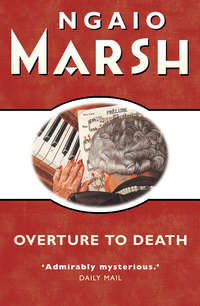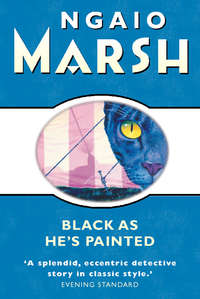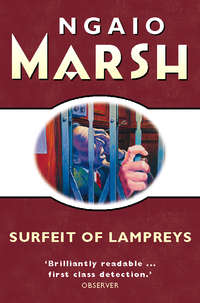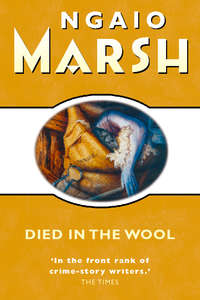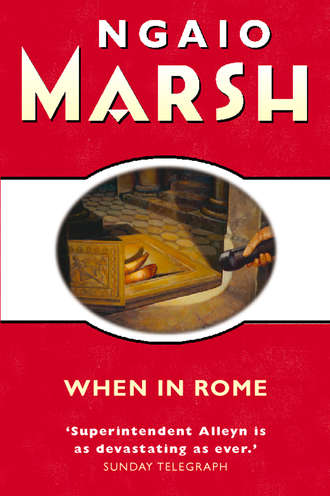
Полная версия
When in Rome
She was still gazing absent-mindedly at the notice when she became aware of a man at her elbow. She had the impression that he must have been there for some time and that he had been staring at her. He continued to stare and she thought: Oh blast! What a bore you are.
‘Do forgive me,’ said the man removing his greenish black hat. ‘Please don’t think me impertinent. My name is Sebastian Mailer. You had noticed my little announcement I believe.’
The girl behind the counter glanced at him. She had painted her nails and now disdainfully twiddled them in the air. Sophy faced Mr Mailer.
‘Yes,’ she said. ‘I had.’
He made her a little bow. ‘I must not intrude. Please!’ and moved away.
Sophy said: ‘Not at all,’ and because she felt that she had made a silly assumption, added: ‘I was so interested to see Barnaby Grant’s name on your card.’
‘I am indeed fortunate,’ Mr Mailer rejoined, ‘am I not? Perhaps you would care—but excuse me. One moment. Would you mind?’
He said something in Italian to the savage girl who opened a drawer, extracted what seemed to be a book of vouchers and cast it on the counter.
Mr Mailer inspected it. ‘Ah yes,’ he said. ‘Others, also, would seem to be interested. We are fully booked, I see.’
At once Sophy felt an acute disappointment. Of all things now, she wanted to join one of Mr Mailer’s highly sophisticated tours. ‘Your numbers are strictly limited, are they?’ she asked.
‘It is an essential feature.’ He was preoccupied with his vouchers.
‘Might there be a cancellation?’
‘I beg your pardon? You were saying?’
‘A cancellation?’
‘Ah. Quite. Well—possibly. You feel you would like to join one of my expeditions.’
‘Very much,’ Sophy said and supposed that it must be so.
He pursed up his full mouth and thumbed over his vouchers. ‘Ah,’ he said. ‘As it falls out! There is a cancellation I see. Saturday, the twenty-sixth. Our first tour. The afternoon and evening. But before you make a decision I’m sure you would like to know about cost. Allow me.’
He produced a folder and turned aside in a gentlemanly manner while Sophy examined it. The itinerary was given and the name of the restaurant where the party would dine. In the evening they would take a carriage drive and then visit a nightclub. The overall charge made Sophy blink. It was enormous.
‘I know,’ Mr Mailer tactfully assured her. ‘But there are many much, much less expensive tours than mine. The Signorina here would be pleased to inform you.’
Obviously he didn’t give a damn whether she went or stayed away. This attitude roused a devil of recklessness in Sophy. After all, mad though it seemed, she could manage it.
‘I shall be very glad to take the cancellation,’ she said and even to herself her voice sounded both prim and defiant.
He said something further in Italian to the girl, raised his hat, murmured, ‘Then—arrivederci’ to Sophy, and left her to cope.
‘You paya to me,’ said the girl ferociously and when Sophy had done so, presented her with a ticket and a cackle of inexplicable laughter. Sophy laughed jauntily if senselessly in return, desiring, as always, to be friendly with all and sundry.
She continued to walk about Rome and to anticipate with feelings she would have been quite unable to define, Saturday, the twenty-sixth of April.
III
‘I must say,’ Lady Braceley murmured, ‘you don’t seem to be enjoying yourself very madly. I never saw such a glum face.’
‘I’m sorry, Auntie Sonia. I don’t mean to look glum. Honestly, I couldn’t be more grateful.’
‘Oh,’ she said, dismissing it, ‘grateful! I just hoped that we might have a nice, gay time together in Rome.’
‘I’m sorry,’ he repeated.
‘You’re so—odd. Restless. And you don’t look at all well, either. What have you been doing with yourself?’
‘Nothing.’
‘On the tiles, I suppose.’
‘I’ll be all right. Really.’
‘Perhaps you shouldn’t have pranced out of Perugia like that.’
‘I couldn’t have been more bored with Perugia. Students can be such an unutterable drag. And after Franky and I broke up—you know.’
‘All the same your parents or lawyers or the Lord Chancellor or whoever it is will probably be livid with me. For not ordering you back.’
‘Does it matter? And anyway—my parents! We know, with all respect to your horrible brother, darling, that the longer his boychild keeps out of his life the better he likes it.’
‘Kenneth—darling!’
‘As for Mummy—what’s the name of that dipso-bin she’s moved into? I keep forgetting.’
‘Kenneth!’
‘So come off it, angel. We’re not still in the ‘twenties, you know.’
They looked thoughtfully at each other.
His aunt said: ‘Were you a very bad lot in Perugia, Kenneth?’
‘No worse than a dozen others.’
‘What sort of lot? What did you do?’
‘Oh,’ Kenneth said, ‘this and that. Fun things.’ He became selfsuffused with charm. ‘You’re much too young to be told,’ he said. ‘What a fabulous dress. Did you get it from that amazing lady?’
‘Do you like it? Yes, I did. Astronomical.’
‘And looks it.’
His aunt eyed herself over. ‘It had better,’ she muttered.
‘Oh lord!’ Kenneth said discontentedly and dropped into a chair. ‘Sorry! It must be the weather or something.’
‘To tell you the truth I’m slightly edgy myself. Think of something delicious and outrageous we can do, darling. What is there?’
Kenneth had folded his hands across the lower half of his face like a yashmak. His large and melting brown eyes looked over the top at his aunt. There was a kind of fitful affectation in everything he did: he tried-on his mannerisms and discarded them as fretfully as his aunt tried-on her hats.
‘Sweetie,’ he said. ‘There is a thing.’
‘Well—what? I can’t hear you when you talk behind your fingers.’
He made a triangular hole with them and spoke through that. ‘I know a little man,’ he said.
‘What little man? Where?’
‘In Perugia and now here.’
‘What about him?’
‘He’s rather a clever little man. Well, not so little, actually.’
‘Kenneth, don’t go on like that. It’s maddening: it’s infuriating.’ And then suddenly:
‘In Perugia. Did you—did you—smoke— ?’
‘There’s no need for the hushed tones, darling. You’ve been handed the usual nonsense, I see.’
‘Then you did?’
‘Of course,’ he said impatiently and, after a pause, changed his attitude. He clasped his hands round his knee and tilted his head on one side. ‘You’re so fabulous,’ he said. ‘I can tell you anything. As if you were my generation. Aren’t we wonderful? Both of us?’
‘Are we? Kenneth—what’s it like?’
‘Pot? Do you really want to know?’
‘I’m asking, aren’t I?’
‘Dire the first time and quite fun if you persevere. Kid-stuff really. All the fuss is about nothing.’
‘It’s done at—at parties, isn’t it?’
‘That’s right, lovey. Want to try?’
‘It’s not habit-forming. Is it?’
‘Of course it’s not. It’s nothing. It’s OK as far as it goes. You don’t get hooked. Not on pot. You’d better meet my little man. Try a little trip. In point of fact I could arrange a fabulous trip. Madly groovy. You’d adore it. All sorts of gorgeous gents. Super exotic pad. The lot.’
She looked at him through her impossible lashes: a girl’s look that did a kind of injury to her face.
‘I might,’ she said.
‘Only thing—it’s top bracket for expense. All-time-high and worth it. One needs lots of lovely lolly and I haven’t—surprise, surprise—got a morsel.’
‘Kenneth!’
‘In fact if my rich aunt hadn’t invited me I would have been out on my little pink ear. Don’t pitch into me, I don’t think I can take it.’
They stared at each other. They were very much alike: two versions of the same disastrous image.
‘I understand you,’ Kenneth said. ‘You know that, don’t you? I’m a sponge, OK? But I’m not just a sponge. I give back something. Right?’ He waited for a moment and when she didn’t answer, shouted, ‘Don’t I? Don’t I?’
‘Be quiet. Yes. Yes, of course you do. Yes.’
‘We’re two of a kind, right?’
‘Yes. I said so, didn’t I. Never mind, darling. Look in my bag. I don’t know how much I’ve got.’
‘God, you’re wonderful! I—I’ll go out straight away. I—I’ll—I’ll get it—‘ his mouth twisted ’—fixed. We’ll have such a—what did that old burnt-out Egyptian bag call it?—or her boyfriend?—gaudy night?—won’t we?’
Her note-case shook in his hand. ‘There isn’t much here,’ he said.
‘Isn’t there?’ she said. ‘They’ll cash a cheque downstairs. I’ll write one. You’d better have something in hand.’
When he had gone she went into her bedroom, sat in front of her glass and examined the precarious mask she still presented to the world.
Kenneth, yawning and sweating, went in febrile search of Mr Sebastian Mailer.
IV
‘It’s the familiar story,’ the tall man said. He uncrossed his legs, rose in one movement, and stood, relaxed, before his companion who, taken by surprise, made a laborious business of getting to his feet.
‘The big boys,’ said the tall man, ‘keep one jump ahead while their henchmen occasionally trip over our wires. Not often enough, however.’
‘Excuse me, my dear colleague. Our wires?’
‘Sorry. I meant: we do sometimes catch up with the secondary villains but their principals continue to evade us.’
‘Regrettably!’
‘In this case the biggest boy of all is undoubtedly Otto Ziegfeldt who, at the moment, has retired to a phoney castle in the Lebanon. We can’t get him. Yet. But this person, here in Rome, is a key man.’
‘I am most anxious that his activities be arrested. We all know, my dear colleague, that Palermo has most regrettably been a transit port. And also Corsica. But that he should have extended his activities to Naples and, it seems, to Rome! No, assure yourself you shall have every assistance.’
‘I’m most grateful to you, Signor Questore. The Yard was anxious that we should have this talk.’
‘Please! Believe me, the greatest pleasure,’ said Il Questore Valdarno. He had a resonant voice and grand-opera appearance. His eyes melted and he gave out an impression of romantic melancholy. Even his jokes wore an air of impending disaster. His position in the Roman police force corresponded, as far as his visitor had been able to work it out, with that of a Chief Constable.
‘We are all so much honoured, my dear Superintendent,’ he continued. ‘Anything that we can do to further the already cordial relationship between our own Force and your most distinguished Yard.’
‘You are very kind. Of course, the whole problem of the drug traffic, as we both know, is predominantly an Interpol affair but as in this instance we are rather closely tied up with them—’
‘Perfectly,’ agreed Valdarno, many times nodding his head.
‘—and since this person is, presumably, a British subject—’
The Questore made a large involved gesture of deprecation: ‘Of course!’
‘—in the event of his being arrested the question of extradition might arise.’
‘I assure you,’ said the Questore, making a joke, ‘we shall not try to deprive you!’
His visitor laughed obligingly and extended his hand. The Questore took it and with his own left hand dealt him the buffet with which Latin gentlemen endorse their friendly relationships. He insisted on coming to the magnificent entrance.
In the street a smallish group of young men carrying a few inflammatory placards shouted one or two insults. A group of police, gorgeously arrayed, pinched out their cigarettes and moved towards the demonstrators who cat-called and bolted a short way down the street. The police immediately stopped and relit their cigarettes.
‘How foolish,’ observed the Questore in Italian, ‘and yet after all, not to be ignored. It is all a great nuisance. You will seek out this person, my dear colleague?’
‘I think so. His sightseeing activities seem to offer the best approach. I shall enrol myself for one of them.’
‘Ah-ah! You are a droll! You are a great droll.’
‘No. I assure you. Arrivederci.’
‘Goodbye. Such a pleasure. Goodbye.’
Having finally come to the end of a conversation that had been conducted in equal parts of Italian and English, they parted on the best of terms.
The demonstrators made some desultory comments upon the tall Englishman as he walked past them. One of them called out, ‘Ullo, gooda-day!’ in a squeaking voice, another shouted. ‘Rhodesia! Imperialismo!’ and raised a cat-call but a third remarked ‘Molto elegante’ in a loud voice and apparently without sardonic intention.
Rome sparkled in the spring morning. The swallows had arrived, the markets were full of flowers, young greens and kaleidoscopic cheap-jackery. Dramatic façades presented themselves suddenly to the astonished gaze, lovely courtyards and galleries floated in shadow and little piazzas talked with the voices of their own fountains. Behind magnificent doorways the ages offered their history lessons in layers. Like the achievements of a Roman pastrycook, thought the tall man irreverently: modern, renaissance, classic, mithraic, each under another in one gorgeous, stratified edifice. It would be an enchantment to walk up to the Palatine Hill where the air would smell freshly of young grass and a kind of peace and order would come upon the rich encrustations of time.
Instead he must look for a tourist bureau either in the streets or at the extremely grand hotel he had been treated to by his Department in London. He approached it by the way of the Via Condotti and presently came upon a window filled with blown-up photographs of Rome. The agency was a distinguished one and their London office well-known to him.
He turned into an impressive interior, remarked that its décor was undisturbed by racks of brochures and approached an exquisite but far from effete young man who seemed to be in charge.
‘Good morning, sir,’ said the young man in excellent English. ‘May I help you?’
‘I hope so,’ he rejoined cheerfully. ‘I’m in Rome for a few days. I don’t want to spend them on a series of blanket-tours covering the maximum amount of Sights in the minimum amount of time. I have seen as much as I can take of celebrated big-boomers. What I would like now is to do something leisurely and civilized that leads one a little off the beaten way of viewing and yet is really—well, really of Rome and not, historically speaking, beside the point. I’m afraid I put that very badly.’
‘But not at all,’ said the young man looking hard at him. ‘I understand perfectly. A personal courier might be the answer but this is the busy season, sir, and I’m afraid we’ve nobody free for at least a fortnight whom I could really recommend.’
‘Somebody told me about something called Il Cicerone. Small parties under the guidance of a—I’m not sure if I’ve got his name right—Sebastian Something? Do you know?’
The young man looked still more fixedly at him and said: ‘It’s odd—really, it’s quite a coincidence, sir, that you should mention Il Cicerone. A week ago I could have told you very little about it. Except, perhaps, that it wasn’t likely to be a distinguished affair. Indeed—‘ he hesitated and then said—’please forgive me, sir. I’ve been at our London office for the past three years and I can’t help thinking that I’ve had the pleasure of looking after you before. Or at least of seeing you. I hope you don’t mind,’ the young man said in a rush. ‘I trust you will not think this insufferable cheek: I haven’t mastered my Anglo-Saxon attitudes, I’m afraid.’
‘You’ve mastered the language, at least.’
‘Oh—that! After an English university and so on, I should hope so.’
‘—and have an excellent memory.’
‘Well, sir, you are not the sort of person who is all that readily forgotten. Perhaps, then, I am correct in thinking—?’
‘You came into the general manager’s office in Jermyn Street while I was there. Some two years ago. You were in the room for about three minutes: during which time you give me a piece of very handy information.’
The young man executed an involved and extremely Italianate gesture that ended up with a smart slap on his own forehead.
‘Ah-ah-ah! Mamma mia! How could I be such an ass!’ he exclaimed.
‘It all comes back to you?’ observed the tall man drily.
‘But completely. All!’ He fell away a step and contemplated his visitor with an air of the deepest respect.
‘Good,’ said the visitor, unmoved by this scrutiny. ‘Now about the Il Cicerone thing—’
‘It is entirely for recreation, sir, that you inquire?’
‘Why not?’
‘Indeed! Of course! I merely wondered—’
‘Come on. What did you wonder?’
‘If perhaps there might be a professional aspect.’
‘And why did you wonder that? Look, Signor Pace—that is your name, isn’t it?’
‘Your own memory, sir, is superb.’
‘Signor Pace. Is there, perhaps, something about this enterprise, or about the person who controls it that makes you think I might be interested in it—or him—for other than sightseeing reasons?’
The young man became pink in the face, gazed at his clasped hands, glanced round the bureau which was empty of other people and finally said, ‘The cicerone in question, Signore—a Mr Sebastian Mailer—is a person of a certain, or perhaps I should say, uncertain reputation. Nothing specific you understand, but there are—’ he agitated his fingers ‘—suggestions. Rome is a great place for suggestions.’
‘Yes?’
‘I remarked that it was quite a coincidence you should inquire about him. That is because he was here earlier today. Not for the first time. He asked to be put on our books some weeks ago but his reputation, his appearance—everything—did not recommend his venture to us and we declined. Then, this morning as a new inducement he brings us his list of patrons. It was quite astonishing, Signore, this list.’
‘May I see it?’
‘We still have not accepted him. I—I don’t quite—’
‘Signor Pace, your guess was a good one. My interest in this person is professional.’
‘Ah!’
‘But I am most anxious to appear simply as a tourist. I remember that in London your chief spoke very highly indeed of your discretion and promise—a promise that is evidently being fulfilled.’
‘You are kind enough to say so, sir.’
‘I realize that I can’t get a booking with Il Cicerone through you but perhaps you can tell me—
‘I can arrange it with another agency and will be delighted to do so. As for the list of patrons: under the circumstances, I think, there is no reason why I should not show it to you. Will you come into the office, if you please. While you examine it I will attend to your booking.’
The list Signor Pace produced was a day-by-day record of people who had put themselves down for Il Cicerone expeditions. It was prefaced by a general announcement that made his visitor blink: ‘Under the distinguished patronage of the celebrated author, Mr Barnaby Grant.’
‘This is coming it strong!’
‘Is it not?’ Signor Pace said, busily dialling. ‘I cannot imagine how it has been achieved. Although—’ he broke off and addressed himself elegantly to the telephone. ‘Pronto. Chi parla?’— and, as an aside: ‘Look at the patronage, Signore. On the first day, Saturday, the twenty-sixth, for instance.’
Here it was, neatly set out in the Italianate script.
Lady Braceley. London The Hon. Kenneth Dorne. London Baron and Baroness Van der Veghel. Geneva Major Hamilton Sweet. London Miss Sophy Jason. London ‘Mr Barnaby Grant (Guest of Honour). LondonAfter further discussion, Signor Pace broke out in a cascade of thanks and compliments and covered the mouthpiece. ‘All is arranged,’ he cried. ‘For whichever tour you prefer.’
‘Without hesitation—the first one. Saturday, the twenty-sixth.’
This, evidently, was settled. Signor Pace hung up and swung round in his chair. ‘An interesting list, is it not? Lady Braceley—what chic!’
‘You may call it that.’
‘Well, Signore! A certain reputation, perhaps. What is called the “jet set”. But from the point of view of the tourist-trade—extremely chic. Great éclat. We always arrange her travel. There is, of course, immense wealth.’
‘Quite so. The alimony alone.’
‘Well, Signore.’
‘And the Hon. Kenneth Dorne?’
‘I understand, her nephew.’
‘And the Van der Veghels?’
‘I am dumb. They have not come our way. Nor have Miss Jason and Major Sweet. But, Signore, the remarkable feature, the really astonishing, as one says, turn-up for the book, is the inclusion of Mr Barnaby Grant. And what is meant, I ask myself, by Guest of Honour?’
“Prime Attraction”, I imagine.’
‘Of course! But for him to consent! To lend his enormous prestige to such a very dim enterprise. And, we must admit, it appears evident that the gimmick has worked.’
‘I wouldn’t have thought Lady Braceley was a natural taker for the intellectual bait.’
‘Signore, he is impressive, he is handsome, he is famous, he is prestigious—Am I correct in saying “prestigious”?’
‘It really means he’s a bit of a conjuror. And so, of course, in a sense, he is.’
‘And therefore to be acquired by Lady Braceley. Or, at least, considered.’
‘You may be right. I understand she’s staying at my hotel. I heard her name at the desk.’
‘Her nephew, Mr Dorne, is her guest.’
‘Fortunate youth! Perhaps. By the way, what are the charges for these jaunts?’
‘In the top bracket and, at that, exceedingly high. I would have said impertinently so but, as you see, he is getting the response. One can only hope the patrons are satisfied.’
‘In any case you have given me the opportunity to form an opinion. I’m extremely obliged to you.’
‘But, please! Come,’ said the jaunty Signor Pace, ‘let us make our addition to the list.’
He gaily drew it towards him and at the bottom wrote his addition.
‘You see!’ he cried in playful triumph. ‘I remembered everything! The rank! The spelling!’
‘If you don’t mind, we’ll forget about the rank and the spelling.’
The visitor drew a line through the word ‘Superintendent’ and another through the letter ‘y’, so that the entry read:
‘R. Allen, London.’
CHAPTER 3 Saturday, the Twenty-sixth
It became fairly clear from the outset why Mr Sebastian Mailer made extravagant charges for his expeditions.
At three-thirty in the afternoon two superb Lancias arrived at the rendezvous near the Church of the Trinity and therefore within a very short distance of the hotel where three of Mr Mailer’s prospects were staying.
From here, as they assembled, his seven guests looked down at April azaleas flaring on the Spanish Steps and at Rome suddenly laid out before them in a wide gesture. There was a sense of opulence and of excitement in the air.


